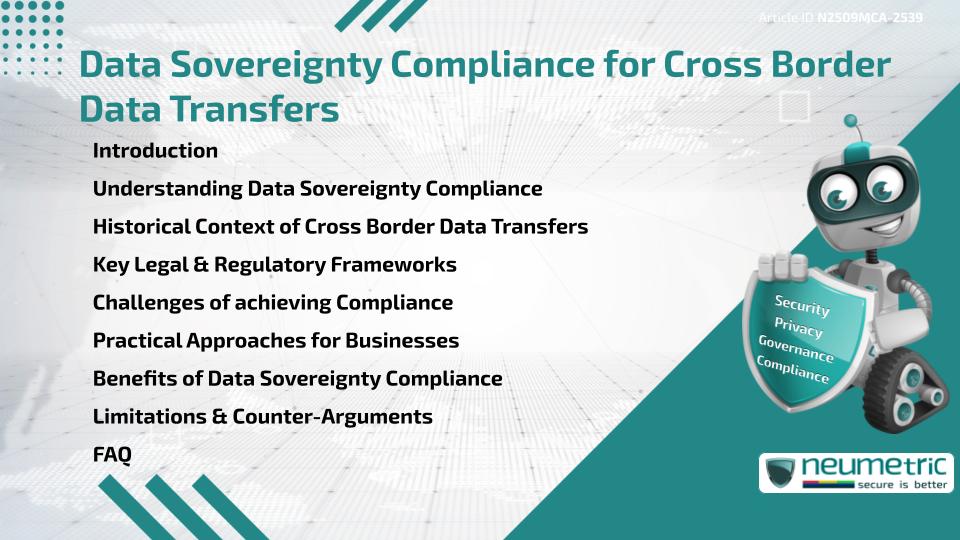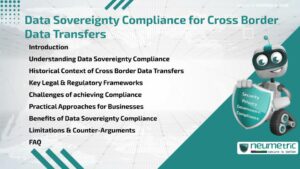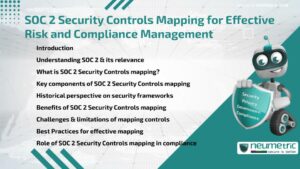Table of Contents
ToggleIntroduction
Data Sovereignty Compliance has become a central issue in how Organisations manage & transfer information across borders. It refers to ensuring that Data is stored, processed & managed in line with the legal requirements of the country where it originates. With increasing global regulations such as the General Data Protection Regulation [GDPR], the California Consumer Privacy Act [CCPA], and similar frameworks worldwide, businesses must carefully navigate the complexities of international Data flows. This article explores the history, challenges, benefits & limitations of Data Sovereignty Compliance for cross border Data transfers.
Understanding Data Sovereignty Compliance
At its core, Data Sovereignty Compliance requires that Data stored or processed in a country be governed by that nation’s laws. For example, a European company transferring Customer Data to servers in the United States must ensure that protections meet the requirements of the GDPR. This concept ensures that Privacy & security obligations remain intact, regardless of where the Data travels.
Historical Context of Cross Border Data Transfers
The issue of Data movement across borders is not new. In the 1990s, as the internet expanded, governments began recognizing the Risks of losing control over Sensitive Information. Agreements such as the EU-US Safe Harbor (later invalidated) and the Privacy Shield attempted to bridge regulatory gaps. However, legal challenges underscored the importance of Sovereignty & national laws in regulating digital assets.
Key Legal & Regulatory Frameworks
Several frameworks govern Data Sovereignty Compliance today:
- GDPR: Europe’s comprehensive law that sets strict requirements for consent, security & transfer mechanisms.
- CCPA: This protects the rights of the Residents of California & also regulates how businesses handle their Data.
- APEC Privacy Framework: A cooperative model for Asia-Pacific countries to ensure Data Protection.
- Local Regulations: Nations like India & China enforce their own rules requiring localized storage of certain categories of information.
Challenges of achieving Compliance
Businesses face several hurdles in meeting Data Sovereignty Compliance:
- Legal Complexity: Different jurisdictions impose conflicting rules.
- Cost: Building local Data centers or using compliant service providers can be expensive.
- Operational Impact: Compliance Requirements may slow down digital transformation.
- Enforcement: Governments can impose heavy penalties for non-Compliance.
Practical Approaches for Businesses
Organisations can adopt several strategies to ensure Compliance:
- Data Mapping: Identifying where Data resides & how it moves.
- Use of Trusted Cloud Providers: Selecting vendors that meet local Compliance standards.
- Encryption & Security: Protecting Data regardless of location.
- Legal Contracts: Implementing binding corporate rules or Standard contractual clauses.
These approaches allow businesses to operate globally while respecting national laws.
Benefits of Data Sovereignty Compliance
While Compliance may seem burdensome, it also provides advantages:
- Enhances Customer Trust & reputation.
- Reduces the Risk of legal penalties.
- Improves Data Governance & accountability.
- Strengthens Cybersecurity measures.
Limitations & Counter-Arguments
Critics argue that Data Sovereignty Compliance can hinder innovation & economic growth. Strict rules may restrict Small Businesses from expanding internationally. Additionally, local storage requirements may not always guarantee stronger Privacy protections if enforcement is weak. Balancing national control with global trade remains a key debate.
Takeaways
Data Sovereignty Compliance for cross border Data transfers is not optional but a necessity in today’s interconnected digital economy. Businesses that align their practices with international & national rules can avoid penalties, build trust & gain a competitive edge.
FAQ
What is Data Sovereignty Compliance?
Data Sovereignty Compliance refers to ensuring that Data is handled according to the laws of the country where it is collected, stored or processed.
Why is Data Sovereignty Compliance important?
It is important because it helps businesses avoid penalties, protect Privacy & maintain trust with Customers while meeting regulatory obligations.
Which laws impact Data Sovereignty Compliance?
Key laws include the GDPR in Europe, the CCPA in California & local Data Protection laws in countries such as China & India.
What challenges do businesses face in Compliance?
Challenges include complex legal landscapes, high costs of local Data centers & balancing global operations with national requirements.
How can businesses achieve Compliance?
They can achieve Compliance through Data mapping, strong security practices, choosing trusted cloud providers & implementing binding contracts.
Does Compliance benefit Organisations?
Yes, it enhances Customer confidence, strengthens Governance & reduces the Risk of costly penalties.
Are there downsides to strict Compliance?
Yes, some argue it may limit business growth, increase costs & stifle innovation, especially for small enterprises.
References
- GDPR Overview
- CCPA Guidelines
- APEC Privacy Framework
- International Association of Privacy Professionals (IAPP)
Need help for Security, Privacy, Governance & VAPT?
Neumetric provides organisations the necessary help to achieve their Cybersecurity, Compliance, Governance, Privacy, Certifications & Pentesting needs.
Organisations & Businesses, specifically those which provide SaaS & AI Solutions in the Fintech, BFSI & other regulated sectors, usually need a Cybersecurity Partner for meeting & maintaining the ongoing Security & Privacy needs & requirements of their Enterprise Clients & Privacy conscious Customers.
SOC 2, ISO 27001, ISO 42001, NIST, HIPAA, HECVAT, EU GDPR are some of the Frameworks that are served by Fusion – a SaaS, multimodular, multitenant, centralised, automated, Cybersecurity & Compliance Management system.
Neumetric also provides Expert Services for technical security which covers VAPT for Web Applications, APIs, iOS & Android Mobile Apps, Security Testing for AWS & other Cloud Environments & Cloud Infrastructure & other similar scopes.
Reach out to us by Email or filling out the Contact Form…





